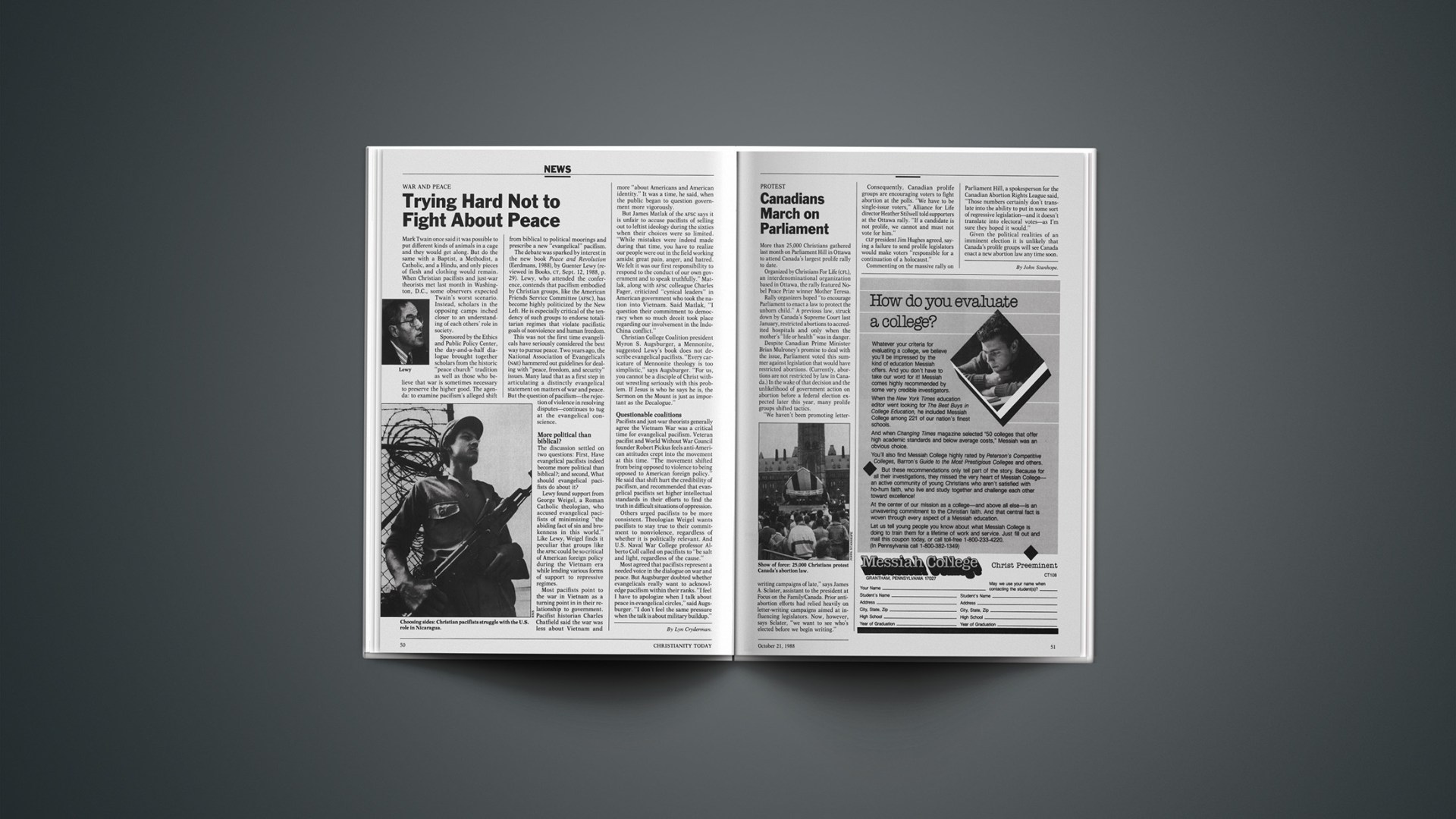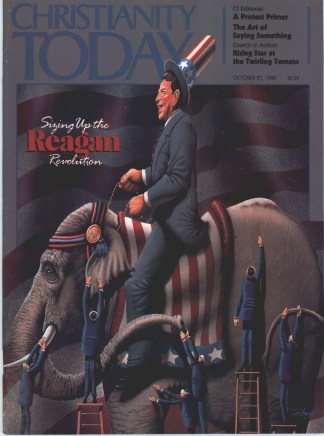WAR AND PEACE
Mark Twain once said it was possible to put different kinds of animals in a cage and they would get along. But do the same with a Baptist, a Methodist, a Catholic, and a Hindu, and only pieces of flesh and clothing would remain. When Christian pacifists and just-war theorists met last month in Washington, D.C., some observers expected Twain’s worst scenario. Instead, scholars in the opposing camps inched closer to an understanding of each others’ role in society.
Sponsored by the Ethics and Public Policy Center, the day-and-a-half dialogue brought together scholars from the historic “peace church” tradition as well as those who believe that war is sometimes necessary to preserve the higher good. The agenda: to examine pacifism’s alleged shift from biblical to political moorings and prescribe a new “evangelical” pacifism.
The debate was sparked by interest in the new book Peace and Revolution (Eerdmans, 1988), by Guenter Lewy (reviewed in Books, CT, Sept. 12, 1988, p. 29). Lewy, who attended the conference, contends that pacifism embodied by Christian groups, like the American Friends Service Committee (AFSC), has become highly politicized by the New Left. He is especially critical of the tendency of such groups to endorse totalitarian regimes that violate pacifistic goals of nonviolence and human freedom.
This was not the first time evangelicals have seriously considered the best way to pursue peace. Two years ago, the National Association of Evangelicals (NAE) hammered out guidelines for dealing with “peace, freedom, and security” issues. Many laud that as a first step in articulating a distinctly evangelical statement on matters of war and peace. But the question of pacifism—the rejection of violence in resolving disputes—continues to tug at the evangelical conscience.
More Political Than Biblical?
The discussion settled on two questions: First, Have evangelical pacifists indeed become more political than biblical?; and second, What should evangelical pacifists do about it?
Lewy found support from George Weigel, a Roman Catholic theologian, who accused evangelical pacifists of minimizing “the abiding fact of sin and brokenness in this world.” Like Lewy, Weigel finds it peculiar that groups like the AFSC could be so critical of American foreign policy during the Vietnam era while lending various forms of support to repressive regimes.
Most pacifists point to the war in Vietnam as a turning point in in their relationship to government. Pacifist historian Charles Chatfield said the war was less about Vietnam and more “about Americans and American identity.” It was a time, he said, when the public began to question government more vigorously.
But James Matlak of the AFSC says it is unfair to accuse pacifists of selling out to leftist ideology during the sixties when their choices were so limited. “While mistakes were indeed made during that time, you have to realize our people were out in the field working amidst great pain, anger, and hatred. We felt it was our first responsibility to respond to the conduct of our own government and to speak truthfully.” Matlak, along with AFSC colleague Charles Fager, criticized “cynical leaders” in American government who took the nation into Vietnam. Said Matlak, “I question their commitment to democracy when so much deceit took place regarding our involvement in the Indochina conflict.”
Christian College Coalition president Myron S. Augsburger, a Mennonite, suggested Lewy’s book does not describe evangelical pacifists. “Every caricature of Mennonite theology is too simplistic,” says Augsburger. “For us, you cannot be a disciple of Christ without wrestling seriously with this problem. If Jesus is who he says he is, the Sermon on the Mount is just as important as the Decalogue.”
Questionable Coalitions
Pacifists and just-war theorists generally agree the Vietnam War was a critical time for evangelical pacifism. Veteran pacifist and World Without War Council founder Robert Pickus feels anti-American attitudes crept into the movement at this time. “The movement shifted from being opposed to violence to being opposed to American foreign policy.” He said that shift hurt the credibility of pacifism, and recommended that evangelical pacifists set higher intellectual standards in their efforts to find the truth in difficult situations of oppression.
Others urged pacifists to be more consistent. Theologian Weigel wants pacifists to stay true to their commitment to nonviolence, regardless of whether it is politically relevant. And U.S. Naval War College professor Alberto Coll called on pacifists to “be salt and light, regardless of the cause.”
Most agreed that pacifists represent a needed voice in the dialogue on war and peace. But Augsburger doubted whether evangelicals really want to acknowledge pacifism within their ranks. “I feel I have to apologize when I talk about peace in evangelical circles,” said Augsburger. “I don’t feel the same pressure when the talk is about military buildup.”
By Lyn Cryderman.










